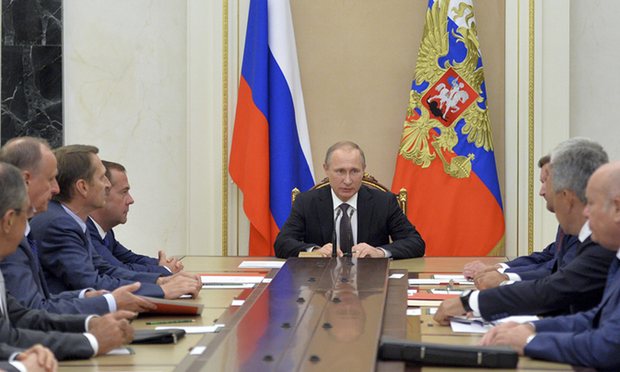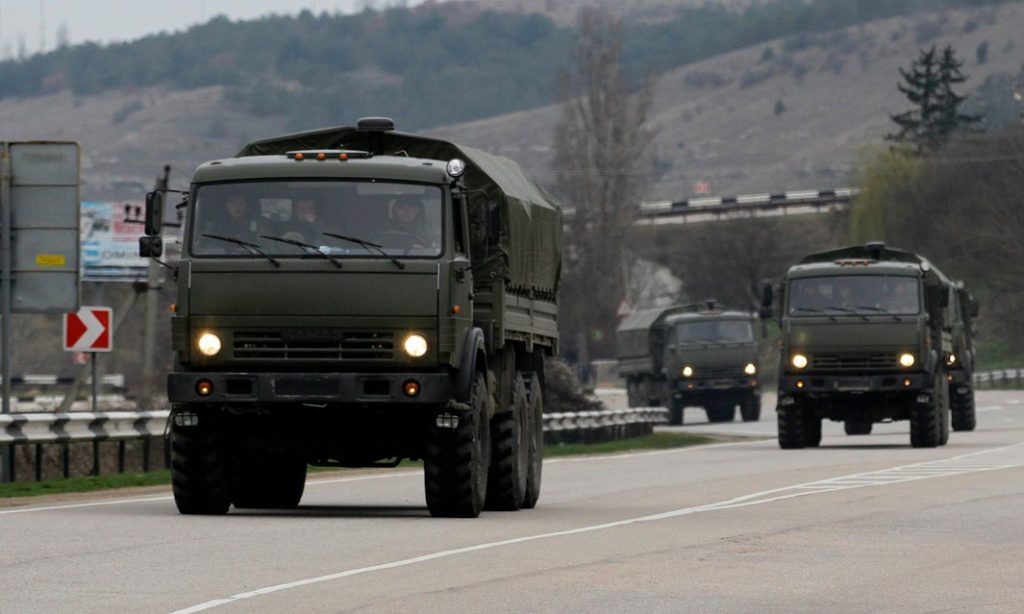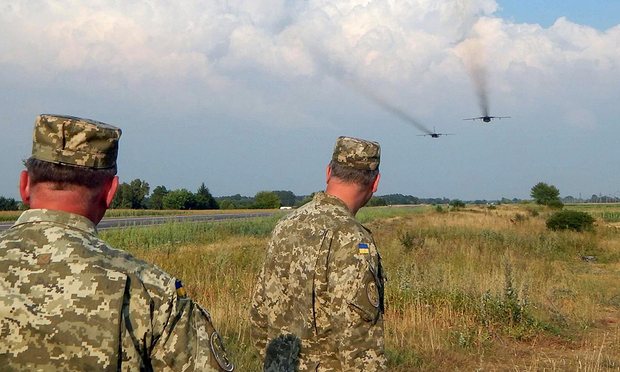Ukrainian soldiers watch frontline bombers during military drills in the Rivne region, Ukraine, this week. Photograph: Reuters
Putin boosts ‘anti-terror’ measures at Ukraine frontier with annexed Crimea as Poroshenko puts troops on combat alert.
Russia and Ukraine stepped up security on the de facto border between Crimea and mainland Ukraine on Thursday, a day after Moscow accused Kiev of planning terror attacks on the peninsula.
The alleged incidents, which have raised tensions over Crimea to the highest level since Russia annexed the region from Ukraine in 2014, took place over the weekend. Russia’s FSB security service claims to have detained a Ukrainian terror cell with 20 homemade explosive devices inside Crimea, and repelled fire from across the border in a separate incident. The FSB said one of its officers and a Russian soldier died during the clashes.
The FSB statement on Wednesday was swiftly followed by tough remarks from Russia’s president, Vladimir Putin, who accused Ukraine of terrorism. “We obviously will not let such things slide by,” Putin said.
On Thursday, Putin met his security council, and the group discussed “additional measures for ensuring security for citizens and essential infrastructure in Crimea”, according to a Kremlin statement. The statement added: “Scenarios were carefully considered for anti-terrorist security measures at the land border, in the waters and in the airspace of Crimea.
 Russia’s president, Vladimir Putin, at his security council meeting in the Kremlin, Moscow, on Thursday. Photograph: Alexei Druzhinin/AP
Russia’s president, Vladimir Putin, at his security council meeting in the Kremlin, Moscow, on Thursday. Photograph: Alexei Druzhinin/AP
Ukraine’s president, Petro Poroshenko, dismissed the allegations, calling them “a pretext for more military threats against Ukraine”. He put his troops in eastern Ukraine and on the border with Crimea on full combat alert.
The international community responded with alarm to the increased tension on the peninsula, and European and US diplomats expressed scepticism over the Russian claims.
The US ambassador to Ukraine, Geoffrey Pyatt, wrote on Twitter: “Russia has a record of frequently levying false accusations at Ukraine to deflect attention from its own illegal actions.”
Russia seized Crimea in 2014, after the Maidan revolution in Kiev led to the country’s then president, Viktor Yanukovych, fleeing. The annexation, carried out by Russian soldiers wearing unmarked uniforms, led to western sanctions against Russia. Further sanctions were later introduced over Russian support for rebels in east Ukraine.
Russia showed no sign of toning down the rhetoric on Thursday, and the Kremlin-appointed head of Crimea, Sergei Aksyonov, suggested executing those who had been arrested. “With saboteurs I think we should act as farmers do with crows who spoil the crops. Kill them and hang their bodies at the border to put off others, and make them understand that Russia will not allow anyone to risk the lives of peaceful citizens or servicemen in Crimea,” Aksyonov told Russian state television. He also accused the US state department of being behind the alleged attacks.
 A Russian convoy in March 2014 moves towards Simferopol, Crimea, a day after Russia’s forces took over the peninsula. Photograph: Darko Vojinovic/AP
A Russian convoy in March 2014 moves towards Simferopol, Crimea, a day after Russia’s forces took over the peninsula. Photograph: Darko Vojinovic/AP
The FSB said it had detained a Ukrainian citizen, Evgeny Panov, whom it claimed was a member of Ukraine’s defence intelligence services. It did not specify how many other people it had detained, or disclose their identity. Reports from Ukraine suggested Panov had been a volunteer with Ukrainian forces in the east of the country but denied he had any links to intelligence. His brother told Ukrainian media he had left his house, in Ukraine’s southern Zaporizhia region, to go to his country house at the weekend and had not been heard from since.
Russian agencies quoted unnamed security sources suggesting that those in detention had confessed to a plan to blow up infrastructure in Crimea, not to cause loss of life but to “destroy the tourist season”.
Poroshenko said it was Russia who was using methods of terror inside Ukraine, with its support for the rebel militia forces in the east of the country. “Ukraine resolutely condemns terrorism in all its forms and shapes. We would never ever use terror to de-occupy Crimea,” the Ukrainian president said in a statement. “Russia provides money and arms to support terrorism in Ukraine. It became a state-led policy on the occupied areas of Crimea and eastern Ukraine – that resembles the Soviet Great Terror.”
Shaun Walker in Moscow, The Guardian





